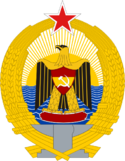Human rights in Burkland
This article needs more links to other articles to help integrate it into the encyclopedia. (July 2023) |
| Burkland |
 This article is part of the series: |
|
|
| Government President |
|---|
|
Guiding Political Ideologies
Executive
Political parties and politicians
|
Human rights in Burkland is a complex legal issue dealing with the socio-economic conditions of the Burklandi people and how the Burklandi government treats them. While most opposition are treated equally under the law the Burklandi government limits the activities of fascists and National Socialists, yet the act of supporting the holocaust is completely illegal.
Death penalty
The death penalty has been seen as an option yet they do not wish to do it. Still, they cannot commit it but if they could methods could be humane or brutal. However, brutality is reserved for the worst of crimes, those being:
- Mass-murder
- Rape
- Disfiguring a person
- or severe war crimes.
Even if the brutal opinion is chosen they still try to keep it at least somewhat humane.
Counter-revolutionary activities
Although no laws regarding counter-revolutionaries exist in Burkland, the President wishes to pass laws about counter-revolutionary activities. If passed, a counter-revolutionary would be defined as a person who
- tries to hand over the nation and its people over to an aggressive and imperialistic power
- attempting to secede from Burkland in order to give an aggressive and imperialistic power control of Burkland, to promote fascism or to cause chaos in Burkland or any related nations or communities
- a people who attempts to create a fascist state in Burkland
- or an anti- or pro-government protester that attacks innocent civilians.
The bill hasn't been proposed because the punishment hasn't been decided.
Extrajudicial punishment
No cases of extrajudiciality in the Burklandi legal system exist, and Matthew Burklandssen is a critic of them in most cases. He plans to propose a bill which would ban the Burklandi government from excising legal judgement to a foreign citizen or group, with the exceptions of attacks against the nation or the crime be done inside the nation. This doesn't include condemning foreign nations which attack another nation without an acceptable justification (although deciding what is acceptable hasn't been planned yet).